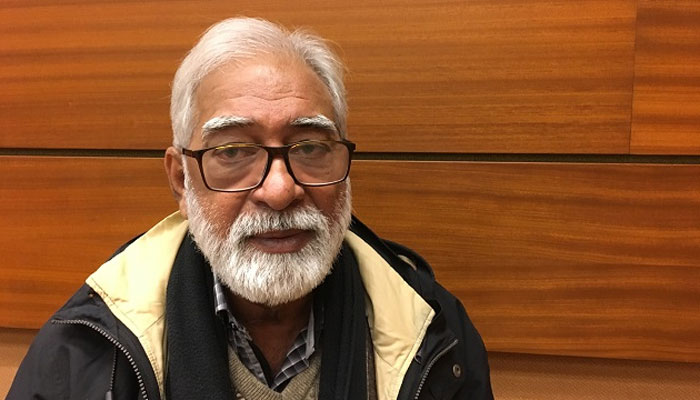‘Social security be made part of fundamental rights in constitution’
The universalisation of the social security services that means every Pakistani worker should have access to the state’s social protection facilities is the only solution to the socio-economic problems of the 65.5 million workforce of the country, said Karamat Ali, executive director of the Pakistan Institute of Labour Education and Research (Piler) here on Friday.
In a statement issued on the occasion of International Labour Day, 2020, he said that currently, social protection was not a fundamental right, and that was why a small number of people were registered with social security and old-age institutions available at both federal and provincial levels.
According to the available data, only 7.12 million workers are registered with the state-owned social security facilities like the provincial social security institutions, Employees Old-age Benefit Institution (EOBI) and Workers Welfare Fund.
An overwhelming majority of the workers were not registered with any such institution; thus, they were deprived of health, education of their children, housing, death and dowry grants and pension facilities being provided by these institutions under the laws, Ali said.
Articles 37 and 38 of the constitutions, which ask the state to provide social protection to the citizens, are in fact not part of the fundamental rights chapter in Pakistan, and the state has not therefore taken serious measures for the provision of such rights during the last 73 years, he said. “We have been demanding that the provision of the social security services should be made part of the fundamental rights chapter in the constitution,” said the Piler chief. The parliament should make necessary amendments in the constitution to introduce social security to the Chapter of Fundamental Rights, he maintained.
Ali said that the lockdown due to the coronavirus pandemic had hit the labourers hard as they were facing lay-offs, non-payment of wages and other livelihood problems. Had there been social security in place, the workers might have got an unemployment allowance due to the lockdown, he said, adding that the current relief package by the federal government had failed to provide relief to a major portion of the population.
The federal government had admitted that there was no data on daily-wage or informal workers. he said.
He recalled that the Sindh government had initiated a process of universalisation of social security services in the province, but there was slow progress in this regard.
-
 Bucks Vs Thunder: Nikola Topic Makes NBA Debut As Milwaukee Wins Big
Bucks Vs Thunder: Nikola Topic Makes NBA Debut As Milwaukee Wins Big -
 King Charles Breaks 'never Complain, Never Explain' Rule Over Andrew's £12 Million Problem
King Charles Breaks 'never Complain, Never Explain' Rule Over Andrew's £12 Million Problem -
 Casey Wasserman To Remain LA Olympics Chair Despite Ghislaine Maxwell Ties
Casey Wasserman To Remain LA Olympics Chair Despite Ghislaine Maxwell Ties -
 Shaun White Is Back At The Olympics But Not Competing: Here’s Why
Shaun White Is Back At The Olympics But Not Competing: Here’s Why -
 Breezy Johnson Engaged At Olympics After Emotional Finish Line Proposal
Breezy Johnson Engaged At Olympics After Emotional Finish Line Proposal -
 King Charles Wants Andrew To 'draw A Line' Under Epstein Issue
King Charles Wants Andrew To 'draw A Line' Under Epstein Issue -
 John Wick Game Confirmed With Keanu Reeves And Lionsgate Collaboration
John Wick Game Confirmed With Keanu Reeves And Lionsgate Collaboration -
 Gigi Hadid Feels 'humiliated' After Zayn Malik's 'pathetic' Comment: Source
Gigi Hadid Feels 'humiliated' After Zayn Malik's 'pathetic' Comment: Source -
 Olympics Men Hockey Game: McDavid, Crosby Power Canada Past Czechia
Olympics Men Hockey Game: McDavid, Crosby Power Canada Past Czechia -
 Sony PlayStation State Of Play Reveals 'Castlevania' And 'Metal Gear' Return
Sony PlayStation State Of Play Reveals 'Castlevania' And 'Metal Gear' Return -
 Ontario Tuition Freeze Ends, Allowing Colleges And Universities To Raise Fees
Ontario Tuition Freeze Ends, Allowing Colleges And Universities To Raise Fees -
 King Charles Should Apologise To All Rape Victims, Says New Poll
King Charles Should Apologise To All Rape Victims, Says New Poll -
 Cardi B Shares Emotional Message Amid Stefon Diggs Split Rumors
Cardi B Shares Emotional Message Amid Stefon Diggs Split Rumors -
 James Van Der Beek’s 'heartbroken' Ex Wife Breaks Silence Of His Death
James Van Der Beek’s 'heartbroken' Ex Wife Breaks Silence Of His Death -
 Sarah Ferguson, Shamed Andrew Spotted In ‘family Costume Drama’
Sarah Ferguson, Shamed Andrew Spotted In ‘family Costume Drama’ -
 Kylie Kelce Reveals Why She Barely Planned Her Wedding Day?
Kylie Kelce Reveals Why She Barely Planned Her Wedding Day?




